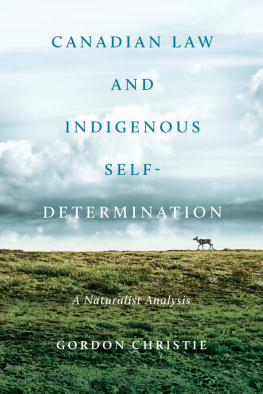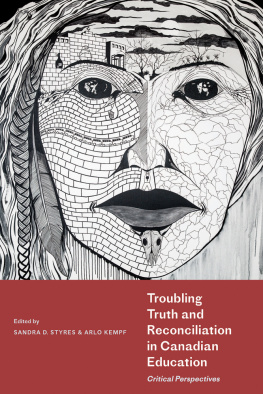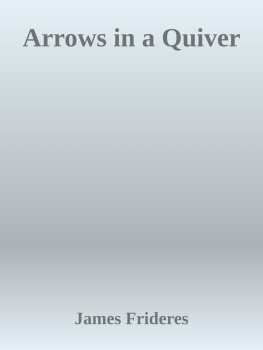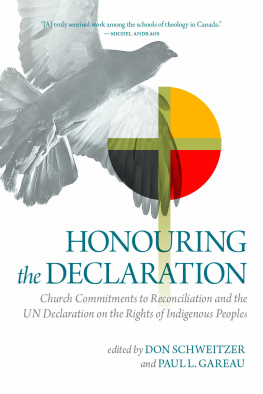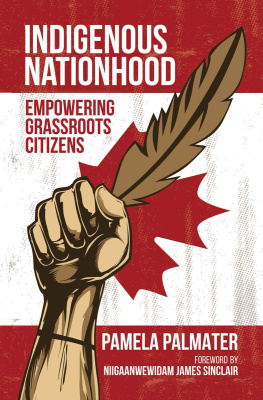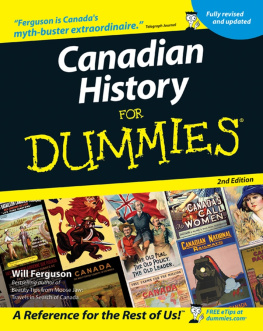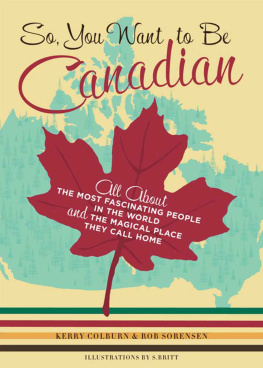Gordon Christie - Canadian Law and Indigenous Self‐Determination: A Naturalist Analysis
Here you can read online Gordon Christie - Canadian Law and Indigenous Self‐Determination: A Naturalist Analysis full text of the book (entire story) in english for free. Download pdf and epub, get meaning, cover and reviews about this ebook. year: 2019, publisher: University of Toronto Press, genre: Romance novel. Description of the work, (preface) as well as reviews are available. Best literature library LitArk.com created for fans of good reading and offers a wide selection of genres:
Romance novel
Science fiction
Adventure
Detective
Science
History
Home and family
Prose
Art
Politics
Computer
Non-fiction
Religion
Business
Children
Humor
Choose a favorite category and find really read worthwhile books. Enjoy immersion in the world of imagination, feel the emotions of the characters or learn something new for yourself, make an fascinating discovery.
- Book:Canadian Law and Indigenous Self‐Determination: A Naturalist Analysis
- Author:
- Publisher:University of Toronto Press
- Genre:
- Year:2019
- Rating:3 / 5
- Favourites:Add to favourites
- Your mark:
- 60
- 1
- 2
- 3
- 4
- 5
Canadian Law and Indigenous Self‐Determination: A Naturalist Analysis: summary, description and annotation
We offer to read an annotation, description, summary or preface (depends on what the author of the book "Canadian Law and Indigenous Self‐Determination: A Naturalist Analysis" wrote himself). If you haven't found the necessary information about the book — write in the comments, we will try to find it.
Canadian Law and Indigenous Self-Determination demonstrates how, over the last few decades, Canadian law has attempted to remove Indigenous sovereignty from the Canadian legal, social, and political landscape.
Gordon Christie: author's other books
Who wrote Canadian Law and Indigenous Self‐Determination: A Naturalist Analysis? Find out the surname, the name of the author of the book and a list of all author's works by series.
Canadian Law and Indigenous Self‐Determination: A Naturalist Analysis — read online for free the complete book (whole text) full work
Below is the text of the book, divided by pages. System saving the place of the last page read, allows you to conveniently read the book "Canadian Law and Indigenous Self‐Determination: A Naturalist Analysis" online for free, without having to search again every time where you left off. Put a bookmark, and you can go to the page where you finished reading at any time.
Font size:
Interval:
Bookmark:

CANADIAN LAW AND INDIGENOUS SELF-DETERMINATION
A Naturalist Analysis
Gordon Christie
For centuries, Canadian sovereignty has existed uneasily alongside forms of Indigenous legal and political authority. Canadian Law and Indigenous Self-Determination demonstrates how, over the last few decades, Canadian law has attempted to remove Indigenous sovereignty from the Canadian legal and social landscape. Adopting a naturalist analysis, Gordon Christie responds to questions about how to theorize this legal phenomenon and how the study of law should accommodate the presence of diverse perspectives. Exploring the socially constructed nature of Canadian law, Christie reveals how legal meaning understood to be the outcome of a specific society is being reworked to devalue the capacities of Indigenous societies.
Addressing liberal positivism and critical postcolonial theory, Canadian Law and Indigenous Self-Determination considers how Canadian jurists, working in a world circumscribed by liberal thought, have deployed the law in such a way as to attempt to remove Indigenous meaning-generating capacity from the Canadian legal landscape.
GORDON CHRISTIE is professor in the Peter A. Allard School of Law at the University of British Columbia.

University of Toronto Press 2019
TorontoBuffaloLondon
utorontopress.com
Printed in Canada
ISBN 978-1-4426-3751-1 (cloth) ISBN 978-1-4426-2899-1 (paper)
Printed on acid-free, 100% post-consumer recycled paper with vegetable-based inks.
Library and Archives Canada Cataloguing in Publication
Title: Canadian law and indigenous self-determination : a naturalist analysis / Gordon Christie.
Names: Christie, Gordon (LL. B.), author.
Description: Includes bibliographical references and index.
Identifiers: Canadiana 20190115521 | ISBN 9781442628991 (paper) | ISBN 9781442637511 (cloth)
Subjects: LCSH: Indians of North America Civil rights Canada. | LCSH: Indians of North America Legal status, laws, etc. Canada. | LCSH: Sociological jurisprudence Canada.
Classification: LCC KE7722.C5 .C57 2019 | LCC KF8205 .C57 2019 kfmod | DDC 342.7108/72dc23
This book has been published with the help of a grant from the Federation for the Humanities and Social Sciences, through the Awards to Scholarly Publications Programme, using funds provided by the Social Sciences and Humanities Research Council of Canada.
University of Toronto Press acknowledges the financial assistance to its publishing programme of the Canada Council for the Arts and the Ontario Arts Council, an agency of the Government of Ontario.

Contents
CANADIAN LAW AND INDIGENOUS SELF-DETERMINATION
A Naturalist Analysis
This text tracks my quest to make sense of Aboriginal law in Canada, with a focus on Aboriginal rights. Aboriginal law in Canada refers to Canadian law as it applies to the situations and lives of Aboriginal people and communities.
This text does not, however, provide a simple unpacking of Aboriginal law. My quest has been intellectually arduous, and this work records a difficult journey. It is a journey made difficult by labyrinthine jurisprudence presenting a deeply puzzling face and the presence of strong disagreement from observers as to what the law seems to express and the nature of impacts it has had on lives and peoples. Equally challenging are quagmires produced by inefficacious legal theory. Not only do mainstream and critical theories move off in completely different directions, but they seem to do so as a result of grounding in fundamentally different presumptions about human nature and the nature of reality itself. Working out how to theorize about Aboriginal law turned out to be one of the more daunting hurdles to overcome before sense could be made of what Canadian courts and legislators have been up in to the last few decades.
A moments reflection on the situation before us casts light on key reasons why making sense of Aboriginal law should be so challenging. Chronicling the development of Aboriginal law is not a simple matter of tracing efforts by domestic courts to deal with a challenging domestic matter rather, courts of the Canadian state have been constructing law meant to regulate the lives of Indigenous peoples, peoples related to but also distinct from the Aboriginal peoples whose rights are now recognized and affirmed in Canadas constitution. Indigenous communities have histories stretching out to times before the Canadian state (and its European predecessors) asserted legislative and judicial control over what is now the territorial extent of this liberal democracy. The phenomena to be explored have specific and troubling characteristics, as they implicate the imposition of Crown sovereignty upon peoples with prior intimate ties to this one land, upon peoples with continuing claims to be self-determining, upon peoples with independent legal and political authority. How is one to make sense of law that washes over other self-determining entities indeed, of law that seems implicated in efforts to remove these competing authorities?
When one sees that Canadian law does not even entertain questions about these fundamentally troubling matters when one sees it begins with and is grounded upon the presumption of Crown sovereignty over Indigenous territories and peoples the strangeness of this landscape opens up. This text begins from a distinct, different starting point the fact of independent Indigenous legal and political authority and attempts to make sense of the emergence of the doctrine of Aboriginal rights in light of that fact. In response to the failure of theory to provide a way to make reasonable sense of the entirety of the situation before us, a major component of this work is taken up with the construction of a theoretical framework within which sense can be made of what we witness when the laws of one society reach out over other legal and political systems, in this instance attempting to enfold within one non-Indigenous reality Indigenous peoples exercising independent authority.
Societies build forms of social reality within which they live. Social roles and interactive structures emerge in varied forms in different societies, where each society gives these roles and structures meaning. Independent Indigenous
These points apply as well to non-Indigenous societies in particular to social worlds built and lived within by Canadian society. The Canadian legal system is itself a manifestation of meaning in the world meaning generated by the society within which this social institution exists. When we trace the history of interaction between what becomes the Canadian Crown and Indigenous peoples over the last few centuries, we see the rise and dominance of forms of colonial dispossession, oppression, and destruction. Lands are taken and peoples are beaten down. But we also witness struggles over other forms of Indigenous self-determination, and in this work I focus on the interaction of Crown and independent Indigenous authority, when both are viewed as essentially being exercised in ways that reflect their groundings in separate meaning-generating social spheres.
The story told is of contemporary efforts, through development and deployment of the doctrine of Aboriginal rights, to remove the last vestiges of Indigenous self-determination from the Canadian landscape. The attempt is to pull Indigenous peoples fully and completely into worlds built according to non-Indigenous ways of thinking of such things as sovereignty, law, and authority. Once the independent meaning-generating abilities of Indigenous peoples are subsumed within the one system of meaning developed by Canadian governments and courts, Indigenous self-determination fades from the landscape.
Next pageFont size:
Interval:
Bookmark:
Similar books «Canadian Law and Indigenous Self‐Determination: A Naturalist Analysis»
Look at similar books to Canadian Law and Indigenous Self‐Determination: A Naturalist Analysis. We have selected literature similar in name and meaning in the hope of providing readers with more options to find new, interesting, not yet read works.
Discussion, reviews of the book Canadian Law and Indigenous Self‐Determination: A Naturalist Analysis and just readers' own opinions. Leave your comments, write what you think about the work, its meaning or the main characters. Specify what exactly you liked and what you didn't like, and why you think so.

